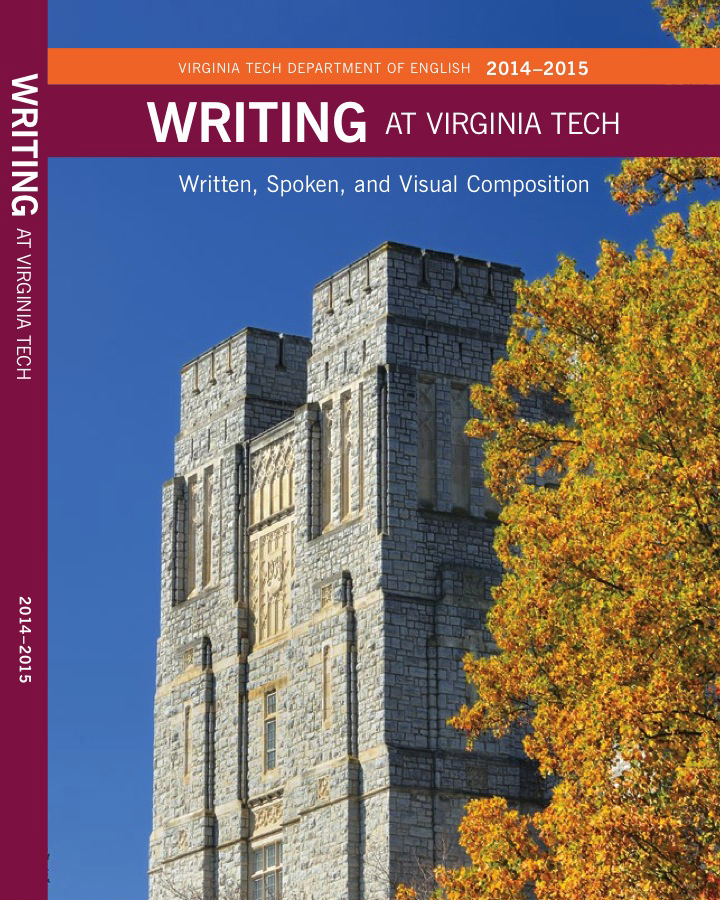Custom textbook features Virginia Tech faculty and student writing

For the last dozen years, first-year writing students at Virginia Tech have received a textbook that aids in the teaching of critical thinking and the writing skills necessary to address a variety of academic and professional audiences. It also has a decidedly maroon-and-orange appeal.
“Writing at Virginia Tech: Written, Spoken, and Visual Composition” is a custom text authored by Virginia Tech faculty members and used by thousands of students for two semesters. It introduces students to the rhetorical dimensions of writing, speaking, and visual communication. It also delves into conventions, such as grammar and style, treating writing as a process.
Write. Read. Revise. Repeat.
The text guides students through a series of carefully designed assignments that build on each other. Just as students are encouraged to revise their work, the textbook is given similar scrutiny. Each year, all aspects of the book are evaluated.
Director of Composition Sheila Carter-Tod, associate professor of rhetoric and the text’s general editor, conducts a survey in the fall semester. Since writing is a course that touches students from all disciplines, she collects feedback from various collaborators, including library associates and deans from every college.
She then works with a committee of English instructors to develop content for the next edition. The instructors co-write the content, and then the chapters go through several rounds of editing and revision. “Teaching writing is dynamic,” said Carter-Tod, “and Virginia Tech’s textbook facilitates that process. The textbook evolves to meet the changing pedagogical and technological needs of both students and instructors.”
For example, following last year’s assessment, the 2014 edition has been streamlined, moving instructor-specific material to a website, Ocelot, while keeping student-specific content the focus of the textbook.
The following 2014-15 edition undergraduate student contributors were honored at the close of the English Undergraduate Research Conference earlier this month:
- Lena Chehab of McLean, Va., a freshman human nutrition, foods, and exercise major in the College of Agriculture and Life Sciences, for “Appreciating What You Have”;
- Laura Jarrett of Woodstock, Va., a sophomore biological sciences major in the College of Science, for “The Gender Game”;
- Kacie Kelly of Mequon, Wis., a sophomore marketing management major in the Pamplin College of Business, for “The Manly Fantasy”;
- Jocelyn Lamb of Alexandria, Va., a freshman majoring in political science in the College of Liberal Arts and Human Sciences, for “Writing and Researching in Political Science”;
- Alex LaRose of Rumson, N.J., a freshman engineering major in the College of Engineering, for “Unshared Happiness: Text Analysis of ‘Death of an Innocent’”;
- Wade Oman of Beverly, Mass., a freshman engineering major, for the blog “Not a Typical Jamaican Vacation”;
- Meagan Satira of Williamsburg, Va., a freshman majoring in animal and poultry sciences in the College of Agriculture and Life Sciences, for “Annotation”;
- Devyn Smith of Broadway, Va., a freshman biological sciences major, also for “Annotation”; and
- Lydia DeAngelis of Virginia Beach, Va., a freshman geosciences major in the College of Science, for “The Changing Water Quality of a 21st-Century Earth.”
“Community at Virginia Tech” was contributed from the team of Casey Fletcher of Smithfield, Va., a freshman in university studies; Nicole Kaminski of Waldorf, Md., a freshman biosciences major in the College of Science; Tori Smith of Winchester, Va., a freshman in university studies; and Marta Timmermann of Roanoke, Va., a freshman in university studies.
In addition, “Who Will Bell the Cat?” was written by Joshua Abe of Kigali, Rwanda, a Virginia Tech graduate and currently a dual degree graduate student in the MBA/industrial systems engineering program.
The text, published by Pearson Press, is used by over 2,500 students, and the profits are all reinvested into the program. These funds have provided assistance to the Writing Center and the Blue Ridge Writing Project, and they have helped with workshops and professional development.
“Virginia Tech believes the First-Year Writing course is a cornerstone in a college-level curriculum,” writes Joe Eska, chair of the Department of English. “Countless graduates have relayed back that they could not believe how much writing they would have to do in their jobs, and that it was the ability to write well that landed them the job in the first place.”
Last fall, the composition program won an Exemplary Department Award for its ability to “effectively implement and assess programs for first year students that incorporate problem solving, inquiry, and integration of learning skills.”




